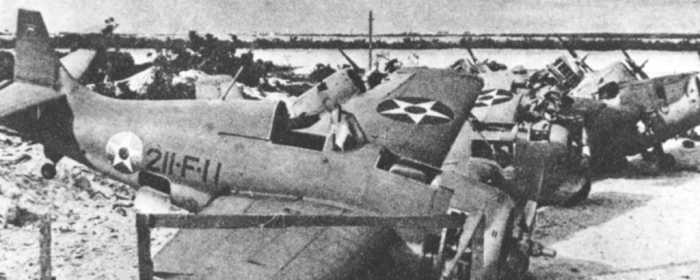The Japanese Suffered in Silence
After seizing Wake Island, the Japanese stationed on the island were cut off from their homeland by the steady American advance through the Pacific. Supplies ran out, forcing the Japanese to eat grass for sustenance, and daily bombing made life miserable on the island. People in the United States never forgot Wake Island and the valorous deeds performed there, but Japanese civilians and military officials gave little notice to the soldiers garrisoned there.
The Japanese suffered quietly, ignored by their own government, until war’s end, at which time the United States returned and reclaimed the land. Partly out of a spirit of vengeance, on October 7, 1943, the hundred civilian construction workers still on Wake were bound, blindfolded, led to the beach, and machine-gunned to death.
Heroes
Four hundred Marines, five Army and 65 Navy personnel, and 1,076 civilians eventually left troop transports and slowly marched through the gates of Asian prison camps that were to be their homes for the next three and a half years. While they endured misery and hardship after performing bravely in the battle, the Wake Island defenders do not think they are heroes. At the island and in prison camp, they simply did their job—no more, no less.
“People always say we’re heroes, and to most Wake Islanders it’s embarrassing,” explained Marine Corporal Franklin D. Gross. “You know, any other group of Marines with the same amount of experience would have done the same thing. It’s no small thing we did, because we probably delayed the Japanese going to Midway about 30 days. They had to go back and regroup, and it took them 16 days to take Wake, so it slowed their timetable. It was quite a feat, but any other bunch of experienced Marines would have done the same.”
Clutching Tightly to Faith
Gross may be right, but the Wake Island defenders, military and civilian alike, were extraordinary individuals. In times of stress they turned to one another, leaned on each other, and maintained faith that each would do his duty.
They also clutched tightly to another faith. At a reunion 40 years after the attack, the author asked LeRoy Schneider what made him survive prison camp when others did not. The imposing Wake Island Marine, still muscular and dignified after all these years, answered with a few simple, yet moving, words. He reached into his pocket and pulled out a well-worn Rosary that looked as if it had been used thousands of times.
“It was this,” he said to me as he nodded toward the string of beads, the same one he had used in prison camp. “Each Sunday a group of us, including Major Devereux, gathered together, got down on our knees, and said the Rosary.” As tears welled in the aged warrior’s eyes, Schneider added, “That’s what got me through.”
National Interest
More about: worldwar
















































